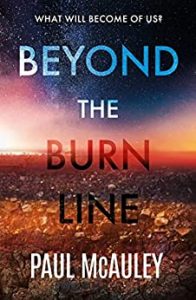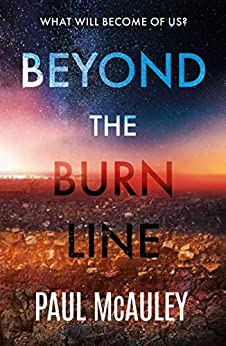Gary K. Wolfe Reviews Beyond the Burn Line by Paul J. McAuley
 Beyond the Burn Line, Paul J. McAuley (Gollancz 978-1-39960-371-3, £22.00, 455pp, hc) September 2022.
Beyond the Burn Line, Paul J. McAuley (Gollancz 978-1-39960-371-3, £22.00, 455pp, hc) September 2022.
Paul McAuley also makes use of bifurcated timelines in Beyond the Burn Line, but on a much vaster scale, and he also considers the global effects of the Anthropocene Era, already relegated to the mists of ancient history as his tale rather modestly begins. Eventually we learn that the “burn line” is the historians’ and archeologists’ term for the set of cataclysms, millennia earlier, that led to the extinction of humans and the later rise of a civilization of bears, which “abruptly collapsed in a plague of madness.” But the novel opens on a note of almost Victorian domestic realism, as Pilgrim Saltmire, the loyal clerk of the scholar Master Able, tries to carry on his master’s work after Able’s death, with virtually no support from the family or from other scholars. The problem is, that although Able had gained fame promoting what amounted to a rediscovery of Darwinian natural selection, he began to lose credibility because of his interest in reports of mysterious Visitors, which other dismiss as mere folk beliefs. Indeed the tales begin to take on a familiar ring – claims of abductions, cattle mutilations, reports of lights in the night sky or of “silvery seeds flying high and fast,” talk of “first contact” and “close encounters.” Trying to track down a map which may answer questions about the Visitors or the Ogres who once ruled the Earth (not hard to figure out who they were), he undertakes a hazardous journey and find allies in the Invisible College, an organization of female researchers who have been excluded from the patriarchal academic mainstream. Much of the fun in these early chapters derives from McAuley showing us how a posthuman civilization reinvents both science and anti-science – everything from evolution and Martian canals to UFO cults and at least one villain, wonderfully named Foeless Landwalker, who makes familiar-sounding political capital out of blatantly false claims, supported by “people who wore orange scarfs and chanted his name as they walked in a procession half a hundred strong.”
All this changes radically in the novel’s second half. Earlier, we were only given a few clues as to what sort of creatures Pilgrim and his colleagues are; we are told they have muzzles and pelts and were once enslaved by the bear civilization (their actual nature eventually become clear). But the second part of the novel begins with a clearly human protagonist, Ysbel Moonsdaughter, working for the Bureau of Indigenous Affairs some decades later. As with Pilgrim, her adventure begins with a rather mundane task – investigating a speedboat collision which left two natives dead–and as with Pilgrim, it eventually leads her to track down that same ancient map. But now the murky legends and charming beast-fable overtones of the first half give way to the sort of SF hardware we’re more familiar with from McAuley, involving tales of seedships seeking other habitable planets, efforts at colonizing the moon and Mars, and “decanting” human stock to begin repopulating the Earth. The question of how much of this is myth and how much is history is part of what Ysbel tries to unpack.
For a novel which initially seems to have little immediate relevance to the Anthropocene crisis, Beyond the Burn Line ends up not only casting a sharply sardonic eye on everything from the politics of exploitation to the politics of science, from bureaucracies to UFO cults to generation starships, from anthropomorphic animal tales to serious speculation about tweaking evolution. The risk he’s taking is that some readers, charmed by Pilgrim and his colleagues, may suffer a bit of whiplash at the midpoint, while other readers, delighted to watch things fall into place in the second half, may feel that Pilgrim’s initial map quest goes on longer than is entirely necessary. But his concluding passages, understated but powerful, make a persuasive case that the novel is deeply engaged with many of the fundamental issues that make SF – well, that make it SF, and especially McAuley’s very distinctive brand of it.
Gary K. Wolfe is Emeritus Professor of Humanities at Roosevelt University and a reviewer for Locus magazine since 1991. His reviews have been collected in Soundings (BSFA Award 2006; Hugo nominee), Bearings (Hugo nominee 2011), and Sightings (2011), and his Evaporating Genres: Essays on Fantastic Literature (Wesleyan) received the Locus Award in 2012. Earlier books include The Known and the Unknown: The Iconography of Science Fiction (Eaton Award, 1981), Harlan Ellison: The Edge of Forever (with Ellen Weil, 2002), and David Lindsay (1982). For the Library of America, he edited American Science Fiction: Nine Classic Novels of the 1950s in 2012, with a similar set for the 1960s forthcoming. He has received the Pilgrim Award from the Science Fiction Research Association, the Distinguished Scholarship Award from the International Association for the Fantastic in the Arts, and a Special World Fantasy Award for criticism. His 24-lecture series How Great Science Fiction Works appeared from The Great Courses in 2016. He has received six Hugo nominations, two for his reviews collections and four for The Coode Street Podcast, which he has co-hosted with Jonathan Strahan for more than 300 episodes. He lives in Chicago.
This review and more like it in the December 2022 issue of Locus.
 While you are here, please take a moment to support Locus with a one-time or recurring donation. We rely on reader donations to keep the magazine and site going, and would like to keep the site paywall free, but WE NEED YOUR FINANCIAL SUPPORT to continue quality coverage of the science fiction and fantasy field.
While you are here, please take a moment to support Locus with a one-time or recurring donation. We rely on reader donations to keep the magazine and site going, and would like to keep the site paywall free, but WE NEED YOUR FINANCIAL SUPPORT to continue quality coverage of the science fiction and fantasy field.
©Locus Magazine. Copyrighted material may not be republished without permission of LSFF.






